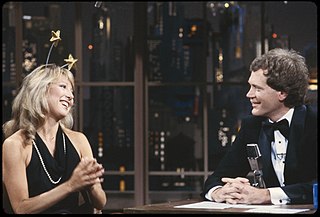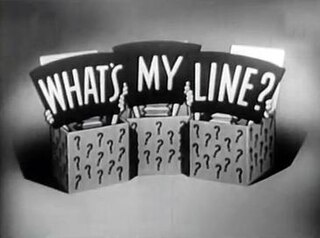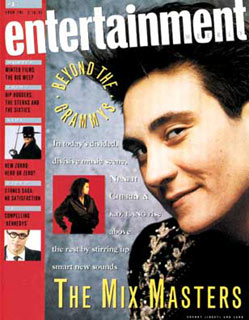Related Research Articles

A talk show is a television programming, radio programming or Podcast genre structured around the act of spontaneous conversation. A talk show is distinguished from other television programs by certain common attributes. In a talk show, one person discusses various topics put forth by a talk show host. This discussion can be in the form of an interview or a simple conversation about important social, political or religious issues and events. The personality of the host shapes the tone and style of the show. A common feature or unwritten rule of talk shows is to be based on "fresh talk", which is talk that is spontaneous or has the appearance of spontaneity.
Variety show, also known as variety arts or variety entertainment, is entertainment made up of a variety of acts including musical performances, sketch comedy, magic, acrobatics, juggling, and ventriloquism. It is normally introduced by a compère or host. The variety format made its way from the Victorian era stage in Britain and America to radio and then television. Variety shows were a staple of English language television from the late 1940s into the 1980s.
Broadcast syndication is the practice of content owners leasing the right to broadcast television shows and radio programs to multiple television stations and radio stations, without going through a broadcast network. It is common in the United States where broadcast programming is scheduled by television networks with local independent affiliates. Syndication is less widespread in the rest of the world, as most countries have centralized networks or television stations without local affiliates. Shows can be syndicated internationally, although this is less common.

What's My Line? is a panel game show that originally ran in the United States, between 1950 and 1967, on CBS. The game show started in black and white and later in color, with subsequent U.S. revivals. The game uses celebrity panelists to question contestants in order to determine their occupation. The majority of the contestants were from the general public, but there was one weekly celebrity "mystery guest" for which the panelists were blindfolded. It is on the list of longest-running U.S. primetime network television game-shows. Originally moderated by John Charles Daly and most frequently with regular panelists Dorothy Kilgallen, Arlene Francis, and Bennett Cerf, What's My Line? won three Emmy Awards for "Best Quiz or Audience Participation Show" in 1952, 1953, and 1958 and the Golden Globe Awards for Best TV Show in 1962.

Television is one of the major mass media outlets in the United States. In 2011, 96.7% of households owned television sets; about 114,200,000 American households owned at least one television set each in August 2013. Most households have more than one set. The percentage of households owning at least one television set peaked at 98.4%, in the 1996–1997 season. In 1948, 1 percent of U.S. households owned at least one television; in 1955, 75 percent did. In 1992, 60 percent of all U.S. households had cable television subscriptions.

Entertainment Weekly is an American digital-only entertainment magazine based in New York City, published by Dotdash Meredith, that covers film, television, music, Broadway theatre, books, and popular culture. The magazine debuted on February 16, 1990, in New York City, and ceased print publication in 2022.

Celebrity Deathmatch is an adult stop-motion claymated series created by Eric Fogel and produced by John Worth Lynn Jr. for MTV. A parody of sports entertainment programs, Celebrity Deathmatch depicted various celebrities engaging in highly stylized professional wrestling matches. The series was known for its large amount of gory violence, including combatants employing different abilities and weapons to deliver particularly brutal attacks, resulting in exaggerated physical injuries.
Late night television is the general term for television programs produced for broadcast during the late evening and overnight hours—most commonly shown after, if not in competition with, local late-evening newscasts; programs that have been showcased in the daypart historically encompassed a particular genre of programming that falls somewhere between a variety show and a talk show. Late-night shows predominantly cater to night owls, people suffering from insomnia, shift workers with irregular schedule assignments, younger male audiences and college students, along with spillover audiences through viewers of entertainment and news programs aired earlier in the evening.
Byron Allen is an American businessman, film and television producer, and comedian. He is the founder of the U.S. media company Entertainment Studios, which has interests in television production, broadcasting, film production, and digital media.

Daytime television is the general term for television programs produced for broadcast during the daytime hours on weekdays; programs broadcast in the daypart historically have been programmed to appeal to a female audience.

20th Television is an American television production company which is a division of Disney Television Studios, part of The Walt Disney Company. Walt Disney Studios Home Entertainment distributes the television series produced by 20th Television in home media formats through the 20th Century Home Entertainment banner.
Jon Kelley is an American sports journalist, author, producer, and television personality. Born and raised in Lincoln, Nebraska, Kelley played four seasons of college football as a running back for the Nebraska Cornhuskers at before graduating from the University of Nebraska–Lincoln with a Bachelor of Arts degree in broadcast journalism. He signed as a free agent with the Denver Broncos of the National Football League (NFL) in 1988 before embarking on a broadcasting career.

This TV is an American free-to-air television network owned by Allen Media Broadcast Networks, LLC, part of the Allen Media Group division of Entertainment Studios. Originally formed in 2008 as a joint venture between Amazon's Metro-Goldwyn-Mayer and Weigel Broadcasting, the network currently carries various unscripted series from Entertainment Studios' library. The network previously had a large programming emphasis on films, primarily sourced from the library of former owner MGM, but all films were dropped from the schedule in 2024. Classic television series and children's programming had also aired on the network previously.

A television show, TV program, or simply a TV show, is the general reference to any content produced for viewing on a television set that is broadcast via over-the-air, satellite, or cable. This includes content made by television broadcasters and content made for broadcasting by film production companies. It excludes breaking news, advertisements, or trailers that are typically placed between shows. Television shows are most often scheduled for broadcast well ahead of time and appear on electronic guides or other TV listings, but streaming services often make them available for viewing anytime. The content in a television show is produced by one of two production methodologies: live taped shows such as variety and news magazine shows shot on a television studio stage or sporting events The other production model includes animation and a variety of film productions ranging from movies to series. Shows not produced on a television studio stage are usually contracted or licensed to be made by appropriate production companies.
Entertainment Studios Networks is a group of seven high-definition cable networks operated by Entertainment Studios, a company owned by and featuring comedian Byron Allen.
Allen Media Group, alternately known by its former name of Entertainment Studios, Inc. is an American media and entertainment company based in Los Angeles. Owned and founded in 1993 by businessman Byron Allen, the company was initially involved in the production and distribution of first-run television series for U.S. television syndication. Under the Entertainment Studios Networks division, it also operates a group of digital cable and satellite channels, which broadcast a mix of original programs and the company's syndicated content.
The Hearst Media Production Group is an American media and production company based in New York City, New York as a division of the Hearst Television subsidiary of Hearst Communications, with three additional offices in Boston, Washington, D.C., and Burbank, California. Many of HMPG's programs comply with federally mandated educational and informational requirements.
We the People is an American dramatized court show that originally ran for 2 seasons, debuting on September 12, 2011, and airing in first-run syndication. The series was originally presented by celebrity lawyer Gloria Allred.
Funny You Should Ask is a syndicated American game show that launched in 2017. It is distributed by Entertainment Studios and hosted by Jon Kelley. Reruns air on the Entertainment Studios cable television channel Comedy.TV and through syndication.
References
- ↑ "Entertainment Studios Inc - Company Profile and News". Bloomberg News . Retrieved July 24, 2022.
- ↑ "Entertainment Studios Corporate". Entertainment Studios. Retrieved July 24, 2022.
- ↑ "Byron Allen". Variety . May 17, 2021. Retrieved July 24, 2022.
- ↑ "How Entertainment Studios Chairman Byron Allen Grew His Media Empire". CSQ Magazine. November 14, 2010. Retrieved July 24, 2022.